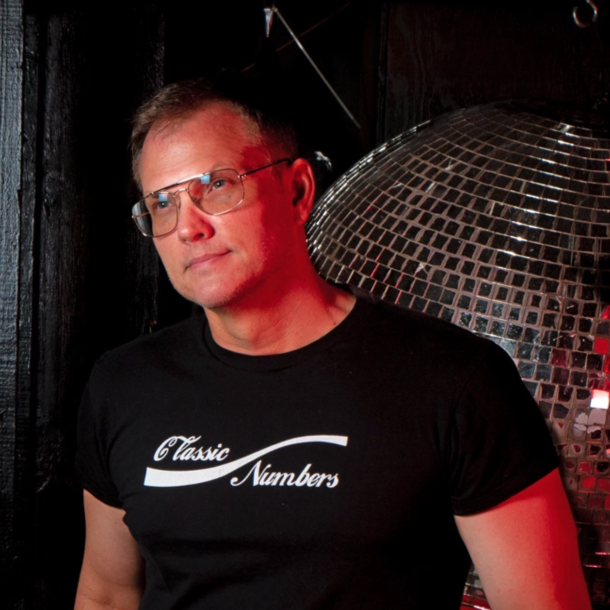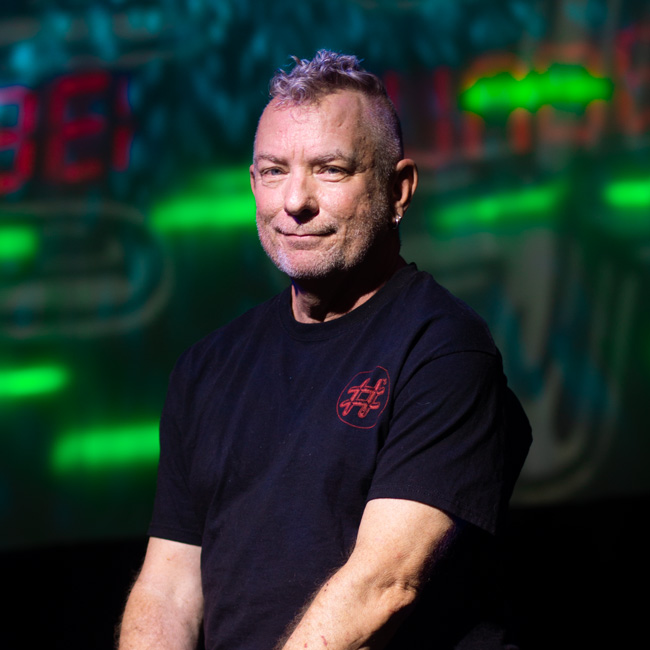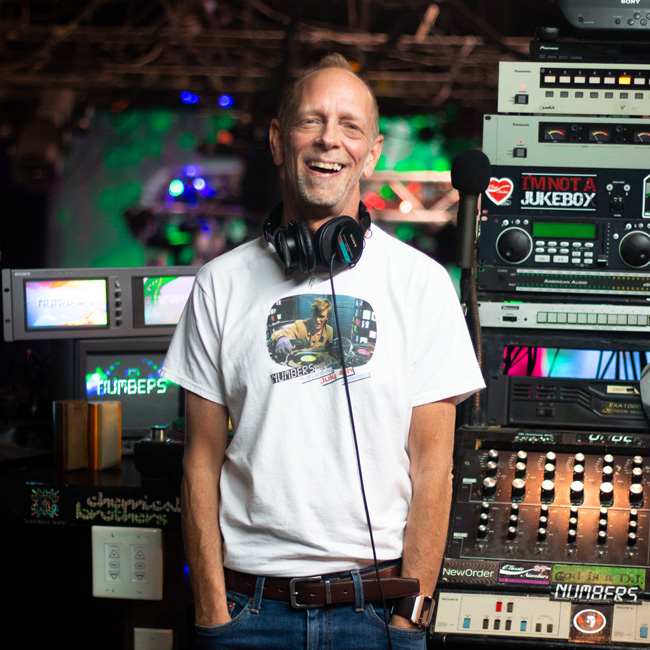

Is there a more storied bar and dance club in Montrose than Numbers? Despite all the colorful competition in the gayborhood, it’s doubtful that anyone will find one as eclectic and universally adored as the one at 300 Westheimer. Now approaching its 43rd year of operation, Numbers has endured through various owners, a few name changes, the disco craze, an unfortunate try at a Country & Western Night, and the most infamous ’80s Night in the city.
The club began its life in 1976 as a dinner theater under owner Beverly Wren. Its name, The Million Dollar City Dump, was a reference to the princely sum it cost her to open the business. That history explains why there’s a large stage in the venue, which featured Las Vegas-style shows. But the format didn’t work well, and by 1978 Wren’s pricey property was looking for a new business model.
Wren was approached by another club owner who proposed transforming her building into a gay disco named Numbers, which lasted for a few years. Following that brief success, the club was renamed Babylon in 1980, which lasted until 1981. The club experienced some ups and downs (and closures) over the next several years before a new team of operators entered the picture and shaped the club into what it is today, starting with previous owner Bruce Godwin. Godwin’s music-industry connections helped the club thrive, and his influence still reverberates today.

“I was working at The Record Rack off South Shepherd. At that time, there were no big chain stores and the DJs were getting their music from me. Every week, I’d give them the latest music, talk about what songs were going to be popular, and give them remixes. In 1980, disco was dying off and new-wave, alternative, electronic, and punk rock gained a following. One of the DJs came to the record store and asked if I’d be interested in working at Numbers on a Thursday night and playing alternative music,” Godwin recalls.
After establishing himself as a weekly DJ, Godwin started to branch out. He had connections with Pace Concerts, and he used those relationships to bring live entertainment to the club. Godwin says well more than 100 Grammy Award winners and thousands of acts have graced the Numbers stage throughout the years. The club’s first act was The Village People, and the list of LGBTQ royalty who played the venue includes acts like Grace Jones, Erasure, Divine, The Pointer Sisters, Sylvester, Melissa Etheridge, and many more.
In spite of the openings and closings throughout the ’70s and ’80s, the venue etched its place in Houston culture, prompting the owners to rebrand Numbers as Numbers 2 in the early ’90s. That’s when it became more than just a live-music venue as people from all walks of life turned out to enjoy the Hakuna Matata vibe embraced by the establishment.
DJ Lane Lewis, who works the turntables on Thursday nights and is launching a new high-energy, retro-modern music show starting July 8, describes the Numbers 2 crowd he often saw. “Within a few feet, there was a middle-aged white accountant dancing by himself, an older Black gentleman dancing by himself, two trans women dancing together, what looked like a college ball player surrounded by three college girls fawning over him, and a Native American guy with his girlfriend. This was a microcosm of the world. Nobody is bickering, fighting, or pointing fingers and judging. I challenge anyone to go to any nightclub in this country and try to find a more diverse, eclectic, and accepting place.”

Believe it or not, Numbers 2 is also a “family” club—of sorts.
“I was in my late teens, and my family and I weren’t getting along very well at that point,” DJ Lewis recalls. “I was coming out in full force, and there were all those familiar conflicts. My mother hated Numbers. She felt it was the home of Satan, and nothing good ever came out of Numbers. [Living with my parents was so tense that] I ended up living with a British family in Southwest Houston. Numbers closed in the mid ’80s and reopened in 1987. For the grand re-opening, my mom picked me up, drove me to the Galleria, and bought me a new suit to wear to the event. That was a big deal to me. Numbers helped me reconnect with my mother, in a way.”
Current Numbers owner Rudi Bunch remembers other stories of families connecting through the club. “For a while, we were getting the same people who had been coming for 10, 15, 20 years. Maybe they met their spouse at the club. Now they have children, and they’re bringing their kids with them to Numbers.”

The Numbers experience is still making an impact on people, all these years after its opening. Bunch says the tried-and-true patrons have been dancing the night away since the ’80s, but the younger generations have started to discover the club, too. The typical age, he says, ranges anywhere from 18 to 60 years old.
Perhaps the teens and 20-somethings are finding the same magic that made Numbers such a compelling draw in days of yore. “Our unofficial slogan is ‘No valet. No cocktail waitresses. No attitude.’ It’s ‘Come as you are’ and discrimination is not permitted. We’ve always tamped down any situation that looked like it might turn ugly for whatever group was being targeted. People have known that, appreciated it, and come to expect that attitude at Numbers. That’s something that will never change,” Bunch emphasizes.
The city’s affection for the venerable Lower Westheimer dance club has only grown stronger over the years. Its Friday nights are dedicated to ’80s music, which is lovingly marketed as “Classic Numbers.” Longtime record-spinner DJ Wes Wallace still presides on Fridays, which are by far the club’s most popular nights. The venue will host a celebration for the 30th anniversary of Classic Numbers on Friday, July 16.

“I haven’t missed a Friday except for one during Hurricane Ike and, of course, the entire pandemic. When I first started DJing on Fridays, it was just the late-’80s classics and remix videos. But it slowly changed into more early-’80s new wave and other different genres, and I eventually started peppering in new music that fit the night. It’s a different vibe every Friday, and it’s always packed, fun, and never a dull moment. People wait all week for it,” Wallace notes.
Classic Numbers earned the attention of one local fan who has created a film about the venue. That documentary, Friday I’m In Love, will be shown at the club on the weekend of July 31.
Indeed, it has been the community’s loyalty that has carried the club through even the hardest of times, including the COVID-19 pandemic. Bunch says business is roaring back now that people feel more comfortable being in close proximity to others.
“We were closed for 14 straight months. We realized we couldn’t reopen a dance venue until there was a vaccine, so we stuck to our guns and waited to reopen. I’m optimistic about our future. People were ready for us to be back open,” Bunch says, adding that his club has become a must-see for the uninitiated. “Numbers is considered by a lot of people to be a Houston institution. If they’re entertaining out-of-town guests, it’s on their must-do list. There are people who travel all around the world, and they say they’ve never found a place like this anywhere else. It’s like a second home. We appreciate that loyalty.”
Numbers is located at 300 Westheimer. For information about special events and the live-entertainment schedule, call 713-521-1121 or visit numbersnightclub.com.
This article appears in the July 2021 edition of OutSmart magazine.
















